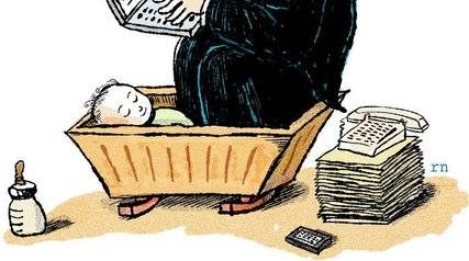November 16, 2016
Two thirds of female professionals’ jobs downgraded after career break 0
 A lack of flexible roles means that two thirds of professional women who return to work after a career break, work fewer hours than they prefer or go into lower-skilled or lower-paid roles, claims new research by PwC, in conjunction with Women Returners and 30% Club. 427,000 UK female professionals are currently estimated to be on a career break and likely to return to the workforce in the future. Of those, three in five (249,000) are likely to enter lower-skilled roles when they return to work. This has serious implications for earnings as this downgrading is associated with an immediate 12-32 percent reduction in hourly earnings, depending on whether the woman remains with the same employer. A further 29,000 women returning to part-time work would prefer to work longer hours but are unable to due to a lack of flexible roles. Altogether, two-thirds of (or around 278,000) women could be working below their potential when they return to the workforce.
A lack of flexible roles means that two thirds of professional women who return to work after a career break, work fewer hours than they prefer or go into lower-skilled or lower-paid roles, claims new research by PwC, in conjunction with Women Returners and 30% Club. 427,000 UK female professionals are currently estimated to be on a career break and likely to return to the workforce in the future. Of those, three in five (249,000) are likely to enter lower-skilled roles when they return to work. This has serious implications for earnings as this downgrading is associated with an immediate 12-32 percent reduction in hourly earnings, depending on whether the woman remains with the same employer. A further 29,000 women returning to part-time work would prefer to work longer hours but are unable to due to a lack of flexible roles. Altogether, two-thirds of (or around 278,000) women could be working below their potential when they return to the workforce.






















 Some may think this is a daft question. They’ll argue that of course people matter when we design workplaces. Granted, there are those for whom the human experience of the built environment is really important. They demonstrate this it in their attitudes and actions. However, based on some of the attitudes and actions I have observed over the years, I would suggest that the belief that people really matter when some designers design workplaces for them is quite frankly all too often skin deep. How do we know this? And if we accept that it is true, it then begs the secondary question of why this should be the case. Is it entirely our fault? What might we do to address the issues? In part, we know that people haven’t really mattered enough in design because of mistakes of the past. Meanwhile, society is facing many pressing challenges, ranging from health to housing, work to economy and climate change to resource depletion.
Some may think this is a daft question. They’ll argue that of course people matter when we design workplaces. Granted, there are those for whom the human experience of the built environment is really important. They demonstrate this it in their attitudes and actions. However, based on some of the attitudes and actions I have observed over the years, I would suggest that the belief that people really matter when some designers design workplaces for them is quite frankly all too often skin deep. How do we know this? And if we accept that it is true, it then begs the secondary question of why this should be the case. Is it entirely our fault? What might we do to address the issues? In part, we know that people haven’t really mattered enough in design because of mistakes of the past. Meanwhile, society is facing many pressing challenges, ranging from health to housing, work to economy and climate change to resource depletion.
 We’re operating in an increasingly tech-centric environment, but human talent still remains one of the core differentiators if a business is to thrive. Not surprisingly, the mission to get the very best people on board and optimise the potential of those already in situ has become the Holy Grail for many companies, irrespective of scale and sector – a challenge that demands a more intuitive and precise, even scientific approach to human capital management. Data analytics is a case in point, designed to extrapolate insight from intelligence across a variety of disparate sources and establish actionable intelligence, capabilities which naturally lend themselves to powering key decisions around hiring and retention and building on existing talent. Yet despite the proliferation of analytics across many strands of the workplace, take up in the HR sphere remains relatively modest, in tandem with a long-held reticence over the use of the technology in this area.
We’re operating in an increasingly tech-centric environment, but human talent still remains one of the core differentiators if a business is to thrive. Not surprisingly, the mission to get the very best people on board and optimise the potential of those already in situ has become the Holy Grail for many companies, irrespective of scale and sector – a challenge that demands a more intuitive and precise, even scientific approach to human capital management. Data analytics is a case in point, designed to extrapolate insight from intelligence across a variety of disparate sources and establish actionable intelligence, capabilities which naturally lend themselves to powering key decisions around hiring and retention and building on existing talent. Yet despite the proliferation of analytics across many strands of the workplace, take up in the HR sphere remains relatively modest, in tandem with a long-held reticence over the use of the technology in this area.








October 4, 2016
Motherhood or livelihood? Pregnancy discrimination in the workplace 0
by Tar Tumber • Comment, Legal news, Wellbeing, Workplace
Recent research by the Commons Women and Equalities Committee suggests that around 54,000 expectant and new mothers have no choice but to leave work due to pregnancy discrimination or concerns over the safety of their children; and shockingly, this figure has doubled in the last decade alone. Other research carried out by the Equality & Human Rights Commission (EHRC) and the former Department for Business, Innovation and Skills shows that despite 77 percent of working mothers reporting potentially discriminatory or negative experiences, only 28 percent raised the issue with their employer, and less than 1 percent pursued a claim through the tribunal system. As a mother of two young children, this is a topic very close to my heart. I have worked in HR for over 18 years now, and advised on all manner of employee relations issues and know from personal experience that being pregnant and suffering discrimination or redundancy is not at all unusual.
(more…)